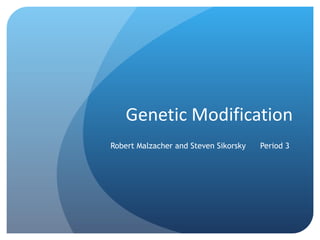
Genetics research-template
- 1. Genetic Modification Robert Malzacher and Steven Sikorsky Period 3
- 2. Basic Principles of Genetics Traits come from your parent’s traits. Your parent could have either a dominant or recessive trait. If you have a recessive allele, ad there is also a dominant in place, the dominant will show. If you have a recessive trait and a dominant trait then you are heterozygous. To find out if you are, you can use a pedigree. Traits with co-dominant alleles are mixed. If a chicken has brown feathers, and another has white feathers and their both co-dominant, then the offspring will have black and white feathers. If one parent has a dominant trait and one has a recessive trait, then the child will have that trait. If they have a recessive trait in place. But if a parent is heterozygous dominant, and the other parent is recessive, there is a possibility that the child will have that recessive trait.
- 4. Genetic Disorder Hemophilia is a sex-linked disorder which means more males get it than females. In Hemophilia the proteins needed to clot blood are not produced. A person could bleed to death just by scraping their knee on the sidewalk. People with this disorder have to take pills with the clotting proteins. Chromosome abnormalities occur when sex cells form during meiosis or the parent already has a mutation in a cell. Down syndrome is caused by a chromosome abnormality because there is an extra copy of chromosome 21. The extra chromosome causes other chromosomes to fail to separate during meiosis which mess up the sex cells to create a child. Genetic counseling can help perspective parents who have a genetic disorder regarding future children because the parents will see what it is like to parent a child with a genetic disorder and they will see the chances of having a child with a genetic disorder. If they do have a child with a genetic disorder then a karyotype could help fix the disorder.
- 5. Argument 1 I think it is wrong to genetically modify foods such as sugar cane, corn, potatoes, strawberries, soy beans, etc. Also 60%-70% of all foods are genetically modified. This can also effect people with allergies. For example, people are mixing tomatoes with peanuts, so it could trigger some peanut allergies.
- 6. Argument 2 Economic Concerns are another big deal. There is a concern that patenting new types of plants will cause the price to rise and small farmers and third world countries will not be able to afford these crops Some argue that in order to combat possible patent infringement there needs to be the creation of a “suicide gene,” which would allow plants to grow for only one season. However, this would force farmers to buy new seeds each year and would be a financial hardship on them.
- 7. Argument 3 Although for some people genetic modification is a breakthrough in scientific history some people think of it as playing God and trying to control every human. I don’t think we should use genetic modification because many dangerous things could come from it. Such as, a doctor accidentally creating a mutation in the DNA which could lead to serious harm or even death.
- 8. Argument 4 If scientists use genetic modification to grow plants they would need genetically engineered seeds which would make every plant and crop be the exact same so if a virus or pest attacks this crop then every crop after that will die and have the same virus or pest which could cause widespread crop failure.
- 9. Conclusion There are many different ways of genetically modifying foods to make completely different ones. This can have serious side effects such as allergies, effects on the surroundings of the environment, and effects on organisms exposed to these different kinds of foods.
- 10. Works Cited "Genetically Engineered Foods: MedlinePlus Medical Encyclopedia." National Library of Medicine - National Institutes of Health. Web. 24 Mar. 2011. http://www.nlm.nih.gov/medlineplus/ency/article/002432.htm. Genetically Modified Foods: Harmful or Helpful?" CSA. Web. 24 Mar. 2011. http://www.csa.com/discoveryguides/gmfood/overview.php. "The Effects of Genetically Modified Foods." Global Healing Center Health Products & Information. Web. 24 Mar. 2011. http://www.globalhealingcenter.com/genetically-modified-foods.html.